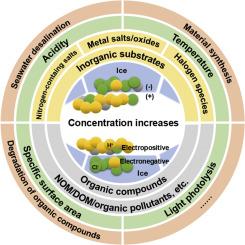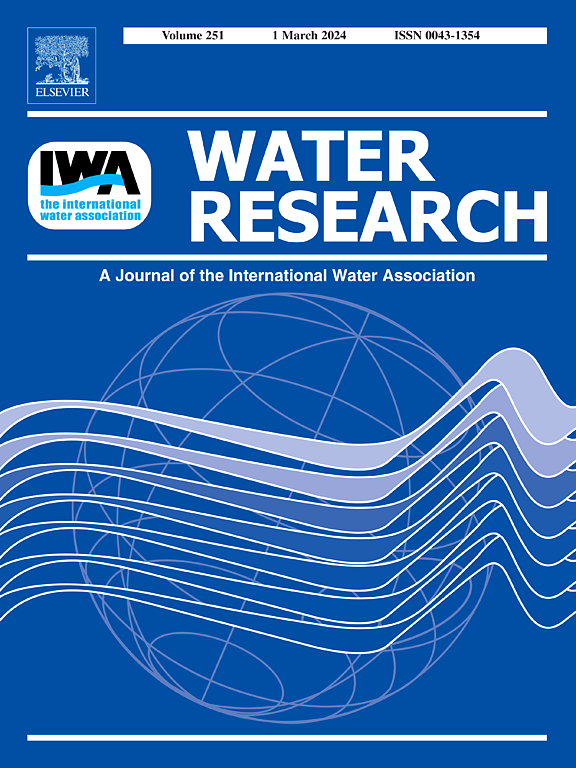冷冻溶液中的无机基质:转化机制和与有机化合物的相互作用综述
IF 12.4
1区 环境科学与生态学
Q1 ENGINEERING, ENVIRONMENTAL
引用次数: 0
摘要
在寒冷的环境中,如极地和高纬度地区,水溶液的冻结在释放和转化营养物质、有机化合物和微量气体方面起着至关重要的作用。冻结过程通常通过降低化学反应的速率来影响生物地球化学循环和环境过程。然而,大量研究发现,在冷冻条件下,一些化学反应可能会意想不到地加速。这些反应包括亚硝酸盐的氧化、金属/金属氧化物的溶解、卤素的转化等。虽然冻结过程对无机基质与共存有机化合物的相互作用有显著影响,但对无机化合物的行为研究却很少。因此,本文综述了无机基质在冷冻过程中的转化行为及其与有机化合物的相互作用。全面讨论了无机基质在冷冻过程中的转化行为,阐明了其潜在机制,并重点讨论了无机基质与共存有机化合物之间的相互作用。同时,阐述了影响冷冻诱导化学过程的关键因素。此外,还探讨了冻结反应在工程过程中的潜在应用。本文旨在加深对冷冻过程在自然环境中底物回收中的重要作用的理解,并补充冰化学领域的知识。本文章由计算机程序翻译,如有差异,请以英文原文为准。


Inorganic substrates in frozen solutions: Transformation mechanisms and interactions with organic compounds - A review
In cold environments, such as polar regions and high latitudes, the freezing of aqueous solutions plays a crucial role in releasing and transforming nutrients, organic compounds, and trace gases. Freezing processes typically affect biogeochemical cycles and environmental processes by reducing the rate of chemical reactions. However, substantial studies have found that some chemical reactions may accelerate unexpectedly under freezing conditions. These reactions include oxidation of nitrite, dissolution of metals/metal oxides, transformation of halogen species, etc. Although freezing process significantly affects the interaction between the inorganic substrate and coexisting organic compounds, there are few review articles on the behavior of the inorganic compound. Therefore, this review examines the transformation behavior of inorganic substrates and their interactions with organic compounds during freezing. The transformation behavior of inorganic substrates during freezing was comprehensively discussed, their underlying mechanisms were elucidated, and the interactions between inorganic substrates and coexisting organic compounds were highlighted. Meanwhile, key factors influencing the freeze-induced chemical processes were articulated. Furthermore, the potential application of freezing reactions in engineering processes is explored. This article aims to improve understanding of the important role of freezing processes in the recycling of substrates in the natural environment and supplement knowledge in the field of ice chemistry.
求助全文
通过发布文献求助,成功后即可免费获取论文全文。
去求助
来源期刊

Water Research
环境科学-工程:环境
CiteScore
20.80
自引率
9.40%
发文量
1307
审稿时长
38 days
期刊介绍:
Water Research, along with its open access companion journal Water Research X, serves as a platform for publishing original research papers covering various aspects of the science and technology related to the anthropogenic water cycle, water quality, and its management worldwide. The audience targeted by the journal comprises biologists, chemical engineers, chemists, civil engineers, environmental engineers, limnologists, and microbiologists. The scope of the journal include:
•Treatment processes for water and wastewaters (municipal, agricultural, industrial, and on-site treatment), including resource recovery and residuals management;
•Urban hydrology including sewer systems, stormwater management, and green infrastructure;
•Drinking water treatment and distribution;
•Potable and non-potable water reuse;
•Sanitation, public health, and risk assessment;
•Anaerobic digestion, solid and hazardous waste management, including source characterization and the effects and control of leachates and gaseous emissions;
•Contaminants (chemical, microbial, anthropogenic particles such as nanoparticles or microplastics) and related water quality sensing, monitoring, fate, and assessment;
•Anthropogenic impacts on inland, tidal, coastal and urban waters, focusing on surface and ground waters, and point and non-point sources of pollution;
•Environmental restoration, linked to surface water, groundwater and groundwater remediation;
•Analysis of the interfaces between sediments and water, and between water and atmosphere, focusing specifically on anthropogenic impacts;
•Mathematical modelling, systems analysis, machine learning, and beneficial use of big data related to the anthropogenic water cycle;
•Socio-economic, policy, and regulations studies.
 求助内容:
求助内容: 应助结果提醒方式:
应助结果提醒方式:


